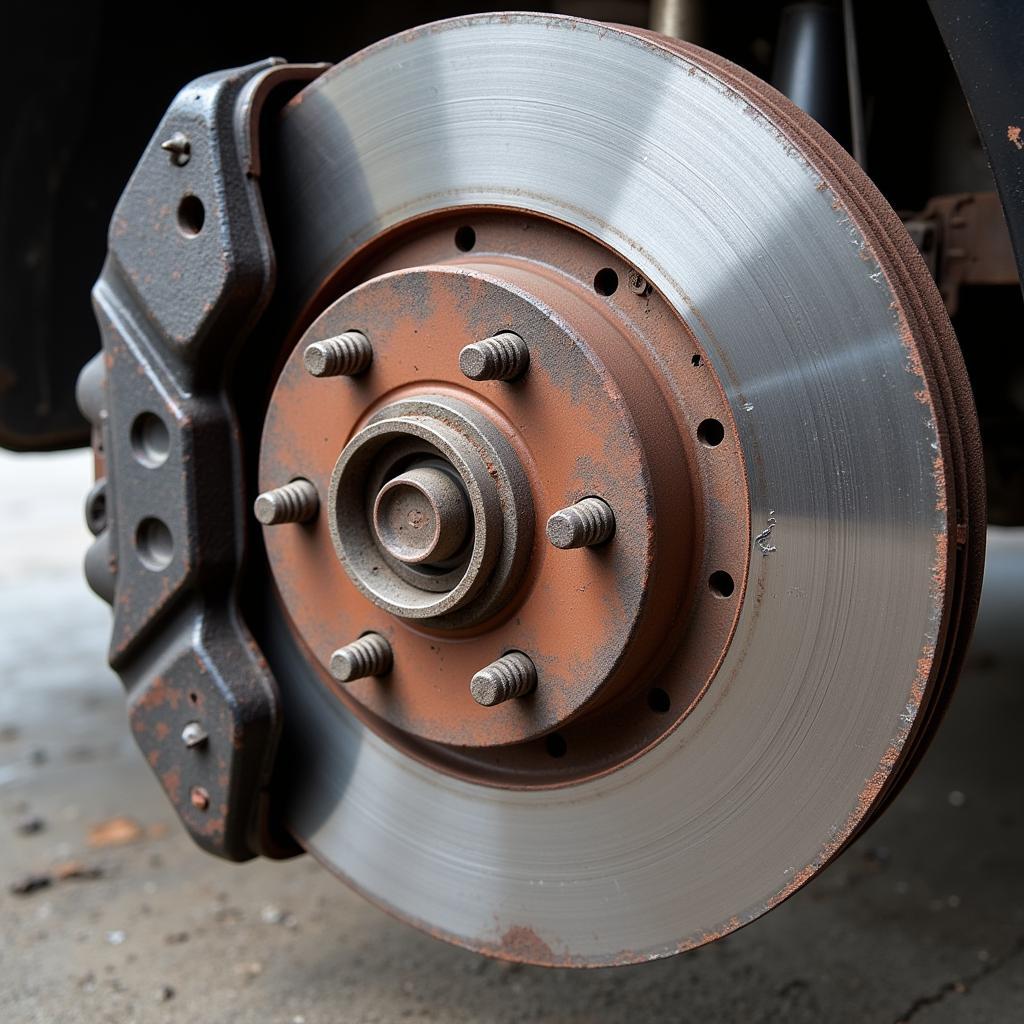A brake system warning light on your BMW can be a disconcerting sight, but it’s important to remain calm and address the issue promptly. This guide will provide comprehensive insights into the common causes of a BMW brake system warning light, how to diagnose the issue, and potential solutions to get your brakes back in working order.
Understanding the Warning Light
BMWs are known for their sophisticated brake systems, and a warning light often indicates a critical issue that requires immediate attention. The warning light can be accompanied by various symptoms, such as a pulsating brake pedal, squeaking noises, or a loss of braking power. It’s essential to understand the potential causes behind the warning light and address them accordingly.
Common Causes of a BMW Brake System Warning Light
Several factors can trigger a brake system warning light on your BMW. Here are some of the most common:
1. Low Brake Fluid
Brake fluid is essential for maintaining the hydraulic pressure that activates your brakes. When the fluid level gets too low, the warning light will illuminate. This can be due to:
- Brake Fluid Leak: A leak in the brake lines or calipers can cause fluid loss.
- Excessive Wear: Worn brake pads can result in excessive fluid consumption as they wear down.
2. Brake Pad Wear
Worn brake pads are a common cause of brake system warning lights. The sensor built into the pads triggers the warning light when the pads reach a certain wear limit.
3. Faulty Brake Sensors
The brake system includes sensors for various components, such as the brake pads, fluid level, and ABS system. A faulty sensor can trigger a warning light even if there is no actual issue with the brakes.
4. ABS System Malfunction
The Anti-lock Braking System (ABS) helps prevent wheel lock-up during braking. A malfunction in the ABS system can trigger a warning light. This can be due to:
- Faulty ABS Sensor: These sensors monitor wheel speed and can malfunction.
- ABS Control Module Failure: The ABS control module is the brain of the system, and a failure can cause a warning light.
5. Electrical Issues
Electrical problems can also contribute to brake system warnings. These can include:
- Faulty Wiring: Damaged or corroded wiring in the brake system can lead to false signals.
- Loose Connections: Loose connections in the electrical system can interrupt the flow of information to the warning light.
Diagnosing the Problem
Accurately diagnosing the cause of a brake system warning light is crucial. Here’s a step-by-step approach:
1. Check Brake Fluid Level
- Location: Check the brake fluid reservoir, usually located under the hood.
- Level: Ensure the fluid is above the “min” mark.
If low:
- Top Up: Add brake fluid of the correct type recommended for your BMW.
- Inspect: Carefully inspect for leaks around the brake lines, calipers, and master cylinder.
2. Inspect Brake Pads
- Visual Inspection: Look at the brake pads through the wheel openings to assess their thickness.
- Wear Indicator: Check for the wear indicator on the brake pads, which will activate when the pads are nearing the end of their life.
If worn:
- Replace: Replace the brake pads with new ones of the correct type.
- Inspect Rotors: Inspect the brake rotors for wear, grooves, or damage.
3. Check Brake Sensors
- ABS Sensors: Examine the ABS sensors for damage or debris.
- Fluid Level Sensor: Ensure the brake fluid level sensor is functioning properly.
If faulty:
- Replace: Replace any faulty sensors.
4. ABS System Diagnosis
- Scan Tool: Use a diagnostic scan tool to check for ABS system error codes.
- ABS Control Module: Inspect the ABS control module for signs of damage.
If necessary:
- Repair: Repair or replace the ABS control module if it’s faulty.
- Professional Assistance: Consult a qualified mechanic for a thorough ABS system diagnosis.
5. Electrical System Inspection
- Wiring and Connections: Carefully inspect the wiring and connections throughout the brake system for damage or corrosion.
- Loose Connections: Tighten any loose connections.
If necessary:
- Repair: Repair or replace any damaged wiring or connections.
Solutions
The best course of action for resolving a BMW brake system warning light depends on the diagnosed issue:
- Low Brake Fluid: Top up the fluid and address any leaks.
- Worn Brake Pads: Replace the brake pads and inspect the brake rotors for wear.
- Faulty Sensors: Replace the faulty sensors.
- ABS System Malfunction: Repair or replace the faulty component in the ABS system.
- Electrical Issues: Repair or replace any damaged wiring or connections.
Common Questions
1. Can I drive my BMW with the brake system warning light on?
It’s generally not recommended to drive with the brake system warning light illuminated. This could indicate a serious issue that could compromise your safety.
2. How do I reset the brake system warning light on my BMW?
While some warning lights can be reset through a simple procedure, such as using the “iDrive” system on newer BMWs, it’s best to consult your owner’s manual or a qualified mechanic. Attempting to reset the warning light without addressing the underlying issue could lead to further problems.
3. How often should I change my brake pads?
The recommended replacement interval for brake pads varies depending on driving habits and conditions. However, most manufacturers recommend replacing them every 25,000 to 50,000 miles.
4. How much does it cost to fix a brake system warning light?
The cost of fixing a brake system warning light can vary significantly based on the issue and the required repairs. It’s best to obtain a quote from a qualified mechanic for an accurate estimate.
5. What are the signs of a failing ABS system?
Besides the warning light, you may experience:
- Pulsating Brake Pedal: A pulsating brake pedal while applying the brakes can indicate an ABS sensor issue.
- Unusual Noises: Clicking or grinding noises during braking may suggest a problem with the ABS system.
- ABS Light Not Illuminating: If the ABS light fails to illuminate during startup, it could indicate a problem with the system.
Conclusion
Addressing a brake system warning light on your BMW is crucial for ensuring safe and reliable driving. Remember to consult your owner’s manual or a qualified mechanic for diagnosis and repair. Early detection and intervention are key to preventing costly repairs and ensuring the safety of yourself and others on the road.


